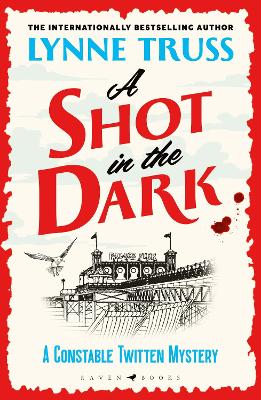
The charming first novel in a new comic crime series, from one of Britain's most-loved writers, the incomparable Lynne Truss
'More Marx Brothers than Agatha Christie, this is crime fiction turned on its head - a giddy spell of sheer delight' Daily Mail
Brighton, 1957. Inspector Steine rather enjoys his life as a policeman by the sea. No criminals, no crime, no stress.
So it's really rather annoying when an ambitious - not to mention irritating - new constable shows up to work and starts investigating a series of burglaries. And it's even more annoying when, after Constable Twitten is despatched to the theatre for the night, he sits next to a vicious theatre critic who is promptly shot dead part way through the opening night of a new play.
It seems Brighton may be in need of a police force after all...
I'm a fan of Lynn Truss' writing, though I haven't read all of it, and when this was announced it went on my wishlist because it's Lynn Truss *and* a mystery.
It was only after I'd finished reading it that I discovered it's a novelisation of something she'd written for BBC Radio 4, so there are those out there who may already be familiar with Constable Twitten, Sergeant Brunswick, and Inspector Steine. These people might be better able to describe this book; the closest I was able to come for my husband was to say it's a little bit like 'Allo 'Allo, but not really. For those not acquainted with British television, I have no parallel to offer. Maybe Hogan's Heroes without Hogan and his heroes?
Set in Brighton in the 50's, this is a comedic mystery; it says so right on the tin. Inspector Steine is basking in the reflected glory of the Middle Street Massacre of 1951, where the two criminal gangs of Brighton gathered one day for a showdown, and every single gang member killed in the subsequent shootout. A shootout that only happened because Inspector Steine and his men stopped along the way to the scene for an ice cream. Now, he believes there is no more crime in Brighton, and is deeply offended by Sergeant Brunswick's insistence that there is. Constable Twitten in new on the scene and brings a level of precociousness and obnoxiousness to the station house that threatens to unravel Steine.
If there's a straight man in this trio, it's Sergeant Brunswick, but even he has his quirky weaknesses, including one for the variety shows and another for a 19 year old seductress who likes to play the criminal element against the law for kicks.
The mystery beings when a theatre critic from London arrives to view the preview showing of a new play called A Shilling in the Meter. There's animosity between the playwright and the critic, but as the reader soon finds out there's animosity between the critic and pretty much everybody - even those that don't know him, due to an unfortunate body odour issue. So it's no surprise to anybody except Twitten when the critic is shot and killed in the theater on opening night. What happens from here is an intricately plotted, but convoluted mystery involving several deaths, both murderous and accidental.
The story is hilarious as only the British can really be, I think; it's a style of humor that won't work for everybody, especially those that don't care for an air of silliness, not even the staid, stiff-upper-lip kind. I enjoyed it, though I didn't love it; there's a genius in Truss' plotting, and in her solution to several character problems. The humor skirted the edges of whack-a-doodle at times, and the police are played for laughs, but Truss made it work for me.
I'm not sure who, if anyone, I'd recommend this book to. It's bound to be one of those that people either enjoy or get fed up with. I'll gladly read another if she writes it; I found the characters charming even when they were being dim, and the story made for a nice break from reality.
Reading updates
-
Started reading
-
30 December, 2018:
Finished reading
-
30 December, 2018:
Reviewed
